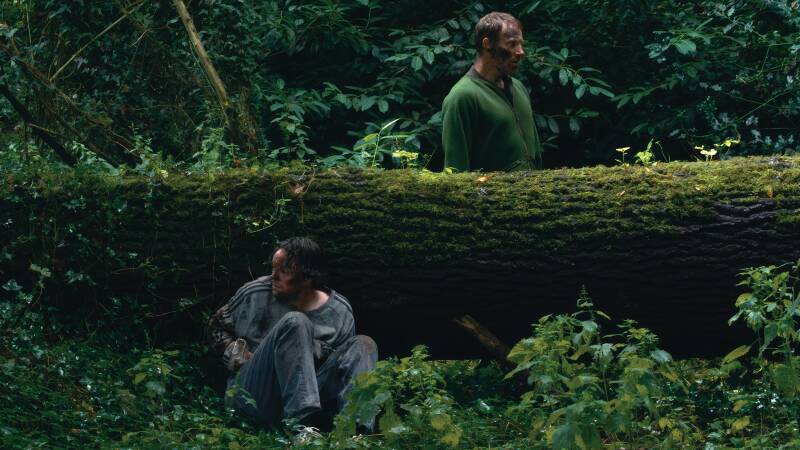
I keep coming back to the way a person can talk themselves into believing they’re the victim of their own decisions. That particular brand of self-pity — the kind that ferments into delusion — fuels "Game," and it hits harder than any sermon about morality ever could. It’s a film that traps you inside someone’s worst moment and then asks: “So… you still think you’d behave better?”
David certainly doesn’t. He’s the kind of man who confuses impulsivity with agency, the kind of bloke who thinks the universe owes him a soft landing simply for surviving the night. And watching his car flipped, his world literally inverted, you feel the weight of a lifetime spent choosing shortcuts. The tragedy isn’t the crash — it’s that you see the man he could’ve been, buried under all that bravado and chemical bravura. Hanging there, upside-down, confused and muck-covered, he finally looks like the helpless child he insists he’s not.
He's a middle-class kidult, reckless and opportunistic, who, after stealing a stash of cash and drugs from a collapsed dealer at a rave and making a runner, ends up crashing his car deep in the woods. Injured and trapped upside-down for hours, exposed and vulnerable, he becomes prey not just to the elements but to the Poacher — a patient, morally ambiguous figure who discovers him days later and, rather than help, decides to watch, judge, and manipulate. The collision of their survival instincts, pride, and petty cruelty turns the forest into a claustrophobic arena where the rules of civility are suspended, and the game of predator and prey takes on both darkly comic and frighteningly human dimensions.
There’s a special kind of tension that comes from being observed by someone who has already made their mind up about you. The Poacher doesn’t threaten, doesn’t rant, doesn’t theatricalise. He simply exists beside David, a presence as calm and merciless as weather. Not evil — just deeply familiar with the cost of softness. His refusal to help lands harder than any act of violence; it’s the sort of judgment that feels ancient, as if the trees themselves had voted no. He stays.
What makes "Game" climb above its lean premise is the way the film folds desperation into absurdity. There are moments where you laugh, then immediately feel guilty, then laugh again because the guilt is part of the design. The forest becomes a playground for hallucination and panic — a rave memory bleeding into bark, shadow and mud, as though the remnants of David’s youth have come to mock him in strobe-lit flashes. The absurdity never breaks the tension; it sharpens it. Surviving becomes both a grim necessity and a sick cosmic joke.
The film’s artistry lives in its tight framing — those claustrophobic close-ups that never let you forget how trapped he is. Every grunt, every shuddering breath, every rustling leaf becomes part of a rhythm that feels maddeningly intimate. You’re not watching his panic from afar; you’re inhaling it with him. And when the film lets itself drift into dreamlike fragments, the forest turns ecclesiastical — a warped sanctuary where memories, delusions, and regrets all queue up for confession.
What impressed me most is how unglamorous it all is. No moral epiphanies, no Hollywood redemption arcs, no convenient catharsis. Just two men circling each other in a patch of English wilderness, proving — with depressing efficiency — how petty, selfish, and strangely hopeful people can be even when they’re at their lowest.
Musically, the movie is a neat trick. Geoff Barrow — who helped shepherd the project and whose fingerprints are all over the score — folds rave euphoria into something warped and elegiac; the soundtrack acts like a ghostly kick drum that reminds the viewer of how close joy and self-destruction slept in the same bed in the early ’90s. When the electronic pulses arrive they do not uplift; they interrogate. The sound design otherwise is surgical: wind in leaves, the shocked silence of a man who’s realised he is not the protagonist of anyone’s mercy. These sonic choices turn what could have been a neat survival thriller into a hallucinatory fable where the forest becomes both church and nightclub in a single, disorienting heartbeat.
Performance-wise, Bessant and Williamson work with a kind of brittle honesty. Bessant gives David a shabby, shifting dignity — he’s both loathsome and desperately sympathetic, which is a difficult balance to hold without tipping into melodrama. Williamson’s poacher is less of a puzzle and more of a slow-moving weather front: you can feel the pressure he applies, even when he’s standing as still as a scarecrow. Their interactions are where the film really hums: not in loud moments, but in the small humiliations traded like currency.
The film’s only real problem is its appetite for lingering: the claustrophobia is deliberate, yes, but there are stretches where the value of a scene is its length rather than its content. If you’re someone who likes a jagged, economy-of-sentiment cut, you might feel it drags. But the film’s patient brutality is also its argument; it insists you sit with your discomfort, and not many films treat you like an adult in that way. The payoff, when it comes, is less a twist than a moral vertigo — you realise you’ve been complicit in tiny cruelties throughout, laughing along when the weaker party stumbles, nodding because it’s convenient.
By the end, I found myself oddly moved. Not in the melodramatic sense, but in the slow, creeping way a bruise reminds you of where you were struck. "Game" doesn’t try to be profound; it’s too honest for that. Instead, it lets its brutality echo. It leaves you with the uncomfortable awareness that even the worst people can be pitiful, and even the pitiful can be monstrous. And somehow, without ever preaching, it makes you want to be better.
8/10
Add comment
Comments